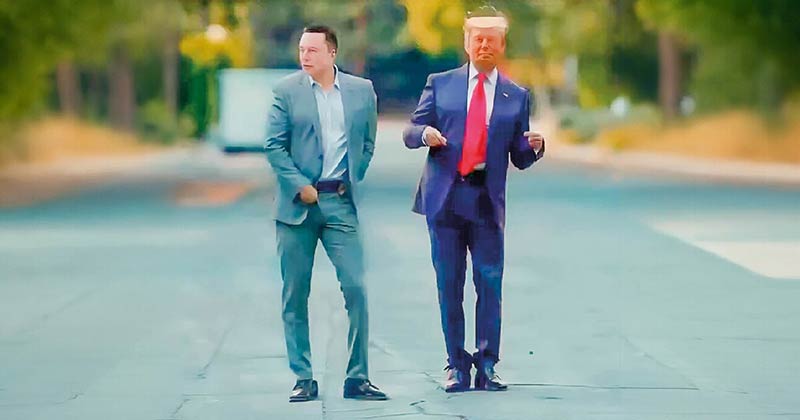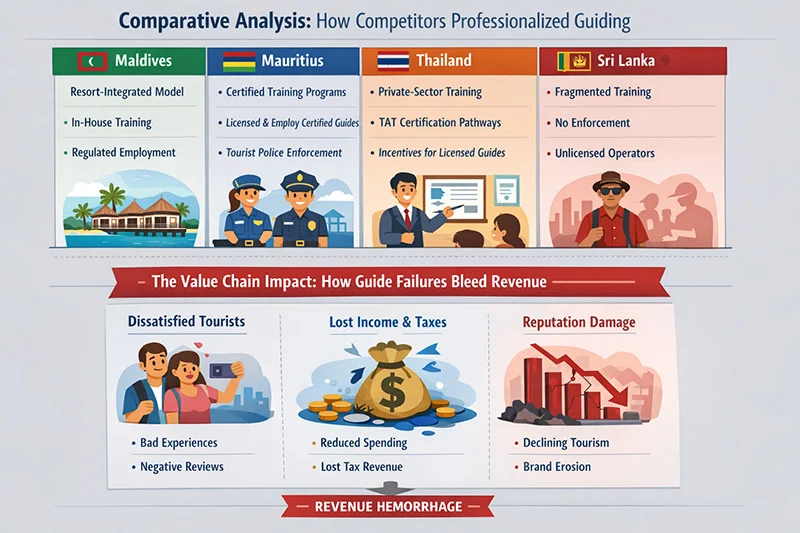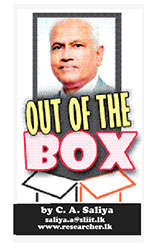Features
President-elect Trump and First Lady Elonia celebrate Thanksgiving at Mar a Lago

Many Trump dubious cabinet nominations unlikely to be confirmed
by Vijaya Chandrasoma
I would like to explain why I continue writing so shamelessly about a subject about which recent events have proved I know next to nothing.
In my defense, the news I have reported over the years has been always been based on facts and the traditional “reliable sources”. Unfortunately, my opinions and predictions have been personal and out of touch with the current political and social climate prevailing in the United States, which has changed substantially since the turn of the century.
I had little interest in politics in the USA during the two decades I lived there. We spent the 90s struggling for survival, doing menial jobs, which is the lot of most immigrants without American educational qualifications and work experience. But by the time I decided to retire in Sri Lanka 20 years later, we had achieved the one ambition that mattered to us. Our children had grasped the wonderful educational opportunities available during the Clinton years to kids who were prepared to work hard, as mine were. They have been amply rewarded for their efforts.
My imagination was captured by the noble aspirations of Senator Barack Obama, an African-American who, in 2008, was shooting for the skies, against all odds. I was a valued volunteer in the Obama presidential campaign office in Phoenix, Arizona, performing such vital tasks as licking stamps and answering telephones in my thick Sri Lankan accent. When Obama was elected the first black president in US history, I, like many an American, was elated that my adopted country had finally turned the racist corner. Man, were we wrong!
I retired in Sri Lanka after the war at home ended in 2009. I had little interest in Sri Lankan politics, though I was struck with grief and disgust at the way our politicians were stealing our beautiful island blind, robbing from the poorest of the poor. But like many self-serving dilettantes of the privileged class, able to comfortably weather these deteriorating economic conditions, my social conscience was conspicuous in its cynical absence.
In any event, I dared not protest against the corrupt politicians in “power”, who held no brook with those who attempted to publicly exercise their constitutional rights of free speech including publication, armed as they were with their own extra-military goon-squads and the infamous “white vans”. Journalism in Sri Lanka was not, in those days, the healthiest of occupations.
I have every confidence that, prayerfully not too late, we have finally replaced a series of crooked governments since Independence with a patriotic leader and a party of politicians intent only on the country’s prosperity and not on their own. A government elected with enormous goodwill, with the hope that a nation with great resources, human and natural, will be administered competently to finally reach its full potential.
With the kind of integrity, discipline and national pride that has transformed Singapore, a shanty town in the 1960s, to one of the most advanced, prosperous city-states in the world, Sri Lanka in the 1950s was one of the richest of British colonies. We could have surpassed Singapore if we had our own Lee Kwan Yew, who once famously said. “I had to choose between democracy and discipline. I chose discipline”.
There is every hope that our present leader will be that Sri Lankan Lee Kwan Yew, even 70 years too late, who will also choose ruthless discipline against international-scale corruption, political extravagance and departmental wastage, the disgusting hallmark of every past Sri Lankan government, which had reached a crescendo of corruption in the new century.
Democracy is a luxury we can enjoy after we have set our house in order. Just like Singapore, a vibrant, prosperous, disciplined democracy today.
So long as President Obama was rescuing the USA from the near economic recession he inherited from the younger Bush, and doing so with competence, grace, compassion, without a trace of political or personal scandal; and so long as my adopted home was progressing inexorably towards its final destination of that Shining City on a Hill, I found no need to express my thoughts on paper.
Until the nation hit a roadblock, when the despicable Donald Trump defeated Hillary Clinton, probably the most qualified candidate in history, for the presidency in 2016. An election that proved conclusively that America remained a deeply racially and ideologically polarized nation. In a perverse sort of way, we should thank Trump and the Republican Party for exposing how Americans really feel, which is far removed from the sanctimonious bull shit they have been feeding the world over the years.
I felt compelled to write, for my own pleasure, an essay about the disaster that my adopted home had wrought upon itself. I sent this essay to my aunt, Ms. Vijita Fernando, distinguished Gratiaen Prize winning journalist/author, who had spoilt me relentlessly since I was in my early teens. She encouraged me to submit this essay to my old friend, the editor of the Sunday Island, who, to my surprise, published it. So at age 75, I became a “journalist”, and enjoyed the heady emotion of seeing my name in print. Writing also provided me with the occupational therapy that helped me occupy my time with a pastime I had always enjoyed.
Donald Trump had inherited a booming economy from President Obama, with 75 weeks of consecutive economic growth and the lowest unemployment rate in decades. I will not repeat details of Trump’s disastrous first term, with enormous tax cuts to benefit the wealthiest, moronic claims that climate change was a hoax and deregulation of environmental pollution laws imposed by President Obama; criminal mismanagement of the Covid pandemic which cost over 650,000 American lives; these were just the “highlights”.
I continued writing on a regular basis about Trump’s criminal misadventures, and when the US electorate came to its senses and dumped him in 2020 in a landslide, and elected President Biden, my relief was palpable. I published a book (for friends and family, not for sale, you may call it an ego trip), which ended with the speech of Oliver Cromwell, on the forcible expulsion of the corrupt and duplicitous Rump Parliament in England in 1653. The last words of that speech were:
“Go, get you out! Make haste! Ye venal slaves be gone! So! Take that shining bauble there, and lock up the doors.
“IN THE NAME OF GOD GO!”
Most appropriate words for Trump and his neo-Nazi Republican cronies of 2020.
Only, those venal bastards didn’t go. Instead, the MAGA (Make America Great Again), white supremacist section of the Republican Party, incited by defeated but incumbent President Trump, tried to violently impede the peaceful transition of power, when a white supremacist mob stormed the Capitol. A felony of sedition. Trump left the White House without observing any of the traditional ceremonies for the changing of the presidential guard. In leaving, he stole boxes of top-secret documents which belonged to the National Archives. A felony of espionage.
The leaders of the Republican Party, who initially denounced Trump, and held him accountable for the crime of inciting the insurrection on January 6, endangering their own miserable lives and the lives of their Congressional colleagues, changed their tune, kissed the ring and made him their Supreme Leader.
So I decided to resume writing, with the ambition of compiling a second book when the criminal Trump, saddled with four indictments, 91 felonies, impending sociopathic dementia and dictatorial hallucinations, would surely be decisively defeated in the presidential election of 2024.
I was, yet again, proved spectacularly wrong. I had, yet again, shown my complete ignorance of the national psyche of the modern United States.
A totally different American electorate, one which voted against the incumbent Democratic administration purely because of high prices and inflation; which voted instead for a proven loser who led a Party which openly espoused a campaign of fear and racial hatred. An electorate too myopic to see that these current high prices and inflation were the result of the near recession that the Biden administration inherited, which had, after four long years, been brought under control by rational and bipartisan legislation. They paid no heed to the opinion of leading economists that the US economy was the strongest and the “envy of the world”. And would only get better.
Instead, they opted for an administration whose proposed economic policies of high tariffs and tax cuts for billionaires and corporations will only bring more grief to the working classes; and whose authoritarian, white supremacist policies will spell the end of democracy in the cradle of democracy.
Even women, who had been deprived of their reproductive freedoms by the most corrupt right wing Supreme Court in history; black males and Latinos, who had been the brunt of Trump’s obscene insults; they incredibly supported this obviously white supremacist authoritarian movement.
A movement financed by billionaires, led by the richest man in the world, Elon Musk, who had financed the Trump election campaign and has been his constant companion at Mar a Lago since the election, the honored family guest at Thanksgiving.
I will conclude this essay with a few undeniable facts. Trump’s felonious conduct is beyond doubt. He has been elected president for a second term, with a jail sentence and trials for felony charges for sedition, obstruction of justice and espionage hanging over him, which would have seen him languishing in federal prison for the rest of his life had he lost the election.
Trump’s selected cabinet is composed almost entirely of yes-men and women, singularly lacking in the morals, intelligence and qualifications, even the confidence of traditional allies, to manage the departments of the most powerful country on the world. Their only essential qualification – blind loyalty to Trump.
Trump’s nomination for Attorney General, depraved Congressman Matt Gaetz, was forced to withdraw his nomination when swirling allegations of sex trafficking and raping underage girls made his confirmation impossible by even Trump’s lapdog majority Senate.
His choice for Secretary of Defense, Pete Hegseth, is a doozy. A marine who served two tours in Afghanistan and Iraq, his only “administrative” experience is as a weekend television host on Fox TV. He has numerous police charges for drunken and disorderly conduct, and sexual assault. Hegseth also believes that torture like waterboarding and war crimes are justified under certain circumstances, and women have no role in military combat. He flaunts a white supremacist tattoo on his body. A lifelong alcoholic, who his Fox colleagues say was often drunk on the job, he has sworn to lay off the booze if confirmed. He even got his mommy to plead on Fox TV that her son is “a changed man”, capable of running the largest bureaucracy in the nation, with three million employees worldwide and an annual budget of $850 billion. After all, he did promise to stay sober on the job.
Hegseth will probably not survive the confirmation process in even the most servile Senate in history. Nor will several other of Trump’s highly dubious cabinet choices : Kash Patel (FBI Director), Tulsi Gabbard (Director of National Intelligence), Robert F. Kennedy Jr (Health Secretary), to name just three. But not to worry, there are plenty more of those creepy nutcases around that Trump will ultimately get confirmed. All they’ll have to do to keep their jobs would be to nod.
President Biden had earlier indicated that he would not be using his presidential powers to pardon his son, Hunter, who had been on trial for two minor charges, committed when he was a drug addict. One, for tax evasion – the back taxes have since been fully paid, with late fees. Two, for the purchase of a gun while he was a drug addict, which was never used in the commission of a crime. A Class E felony, which would been dismissed with a slap on the wrist for a first offender, had his name been anything but Biden.
Hunter is completely sober today.
But President Biden, mindful of the retribution threatened by the Trump’s nominees for Attorney General, Pam Bondi and FBI Director, Kash Patel, against Trump’s imagined “enemies”, knew that Hunter would be tormented, and have the book thrown at him, to a maximum of 17 years’ jail time.
So President Biden lied, he undeniably abused his power and went back on his word to grant Hunter a full pardon. Which any father would have done for his son in a heartbeat.
As the saying goes, Democrats are expected to be flawless, while Republicans can be as lawless as they please. Biden’s pardon had the hypocritical Republicans screaming foul, claiming that he was guilty of gross abuse of power. Forgetting the traitors and fraudsters Trump had pardoned during his first term, and has promised to pardon in his second. They are insisting that, as a quid pro quo, Biden should pardon Trump for his conviction of 34 felonies, and other indictments of sedition, obstruction of justice and espionage, for which he is awaiting trial. The moral equivalent of pardoning a traitor as a quid pro quo for pardoning a jaywalker!
President Biden would be well advised to give advance pardons to himself, Special Counsel Jack Smith, Liz Cheney, Dr. Fauci and those named “enemies from within” like Nancy Pelosi and Adam Schiff that Trump has threatened to prosecute and imprison after his inauguration.
Trump has told us exactly what he’s going to do when he is in power, and Wannabe Hitler is not playing games. With white supremacists and neo-Nazi “strategists” like Jason Miller, Stephen Miller and Steve Bannon in Trump’s backroom, and a supporting cast of thousands of Christian nationalists and avaricious billionaires, America had better fasten its collective seatbelts.
The tragedy for the ages is that the majority of the citizens of the most educated, powerful and richest nation in the world has elected to be led, with the powers of a monarch, by a self-confessed white supremacist on the cusp of dementia, an illiterate, cruel wannabe dictator and a political party of violent Nazi Brownshirts.
Shades of the Third Reich in Germany in 1932, with the caricature American Hitler elected as the Fuhrer.
I hope I am wrong, as usual.
Features
The invisible crisis: How tour guide failures bleed value from every tourist

 (Article 04 of the 04-part series on Sri Lanka’s tourism stagnation)
(Article 04 of the 04-part series on Sri Lanka’s tourism stagnation)
If you want to understand why Sri Lanka keeps leaking value even when arrivals hit “record” numbers, stop staring at SLTDA dashboards and start talking to the people who face tourists every day: the tour guides.
They are the “unofficial ambassadors” of Sri Lankan tourism, and they are the weakest, most neglected, most dysfunctional link in a value chain we pretend is functional. Nearly 60% of tourists use guides. Of those guides, 57% are unlicensed, untrained, and invisible to the very institutions claiming to regulate quality. This is not a marginal problem. It is a systemic failure to bleed value from every visitor.
The Invisible Workforce
The May 2024 “Comprehensive Study of the Sri Lankan Tour Guides” is the first serious attempt, in decades, to map this profession. Its findings should be front-page news. They are not, because acknowledging them would require admitting how fundamentally broken the system is. The official count (April 2024): SLTDA had 4,887 licensed guides in its books:
* 1,892 National Guides (39%)
* 1,552 Chauffeur Guides (32%)
* 1,339 Area Guides (27%)
* 104 Site Guides (2%)
The actual workforce: Survey data reveals these licensed categories represent only about 75% of people actually guiding tourists. About 23% identify as “other”; a polite euphemism for unlicensed operators: three-wheeler drivers, “surf boys,” informal city guides, and touts. Adjusted for informal operators, the true guide population is approximately 6,347; 32% National, 25% Chauffeur, 16% Area, 4% Site, and 23% unlicensed.
But even this understates reality. Industry practitioners interviewed in the study believe the informal universe is larger still, with unlicensed guides dominating certain tourist hotspots and price-sensitive segments. Using both top-down (tourist arrivals × share using guides) and bottom-up (guides × trips × party size) estimates, the study calculates that approximately 700,000 tourists used guides in 2023-24, roughly one-third of arrivals. Of those 700,000 tourists, 57% were handled by unlicensed guides.
Read that again. Most tourists interacting with guides are served by people with no formal training, no regulatory oversight, no quality standards, and no accountability. These are the “ambassadors” shaping visitor perceptions, driving purchasing decisions, and determining whether tourists extend stays, return, or recommend Sri Lanka. And they are invisible to SLTDA.
The Anatomy of Workforce Failure
The guide crisis is not accidental. It is the predictable outcome of decades of policy neglect, regulatory abdication, and institutional indifference.
1. Training Collapse and Barrier to Entry Failure
Becoming a licensed National Guide theoretically requires:
* Completion of formal training programmes
* Demonstrated language proficiency
* Knowledge of history, culture, geography
* Passing competency exams
In practice, these barriers have eroded. The study reveals:
* Training infrastructure is inadequate and geographically concentrated
* Language requirements are inconsistently enforced
* Knowledge assessments are outdated and poorly calibrated
* Continuous professional development is non-existent
The result: even licensed guides often lack the depth of knowledge, language skills, or service standards that high-yield tourists expect. Unlicensed guides have no standards at all. Compare this to competitors. In Mauritius, tour guides undergo rigorous government-certified training with mandatory refresher courses. The Maldives’ resort model embeds guide functions within integrated hospitality operations with strict quality controls. Thailand has well-developed private-sector training ecosystems feeding into licensed guide pools.
2. Economic Precarity and Income Volatility
Tour guiding in Sri Lanka is economically unstable:
* Seasonal income volatility: High earnings in peak months (December-March), near-zero in low season (April-June, September)
* No fixed salaries: Most guides work freelance or commission-based
* Age and experience don’t guarantee income: 60% of guides are over 40, but earnings decline with age due to physical demands and market preference for younger, language-proficient guides
* Commission dependency: Guides often earn more from commissions on shopping, gem purchases, and restaurant referrals than from guiding fees
The commission-driven model pushes guides to prioritise high-commission shops over meaningful experiences, leaving tourists feeling manipulated. With low earnings and poor incentives, skilled guides exist in the profession while few new entrants join. The result is a shrinking pool of struggling licensed guides and rising numbers of opportunistic unlicensed operators.
3. Regulatory Abdication and Unlicensed Proliferation
Unlicensed guides thrive because enforcement is absent, economic incentives favour avoiding fees and taxes, and tourists cannot distinguish licensed professionals from informal operators. With SLTDA’s limited capacity reducing oversight, unregistered activity expands. Guiding becomes the frontline where regulatory failure most visibly harms tourist experience and sector revenues in Sri Lanka.
4. Male-Dominated, Ageing, Geographically Uneven Workforce
The guide workforce is:
* Heavily male-dominated: Fewer than 10% are women
* Ageing: 60% are over 40; many in their 50s and 60s
* Geographically concentrated: Clustered in Colombo, Galle, Kandy, Cultural Triangle—minimal presence in emerging destinations
This creates multiple problems:
* Gender imbalance: Limits appeal to female solo travellers and certain market segments (wellness tourism, family travel with mothers)
* Physical limitations: Older guides struggle with demanding itineraries (hiking, adventure tourism)
* Knowledge ossification: Ageing workforce with no continuous learning rehashes outdated narratives, lacks digital literacy, cannot engage younger tourist demographics
* Regional gaps: Emerging destinations (Eastern Province, Northern heritage sites) lack trained guide capacity
1. Experience Degradation Lower Spending
Unlicensed guides lack knowledge, language skills, and service training. Tourist experience degrades. When tourists feel they are being shuttled to commission shops rather than authentic experiences, they:
* Cut trips short
* Skip additional paid activities
* Leave negative reviews
* Do not return or recommend
The yield impact is direct: degraded experiences reduce spending, return rates, and word-of-mouth premium.

2. Commission Steering → Value Leakage
Guides earning more from commissions than guiding fees optimise for merchant revenue, not tourist satisfaction.
This creates leakage: tourism spending flows to merchants paying highest commissions (often with foreign ownership or imported inventory), not to highest-quality experiences.
The economic distortion is visible: gems, souvenirs, and low-quality restaurants generate guide commissions while high-quality cultural sites, local artisan cooperatives, and authentic restaurants do not. Spending flows to low-value, high-leakage channels.
3. Safety and Security Risks → Reputation Damage
Unlicensed guides have no insurance, no accountability, no emergency training. When tourists encounter problems, accidents, harassment, scams, there is no recourse. Incidents generate negative publicity, travel advisories, reputation damage. The 2024-2025 reports of tourists being attacked by wildlife at major sites (Sigiriya) with inadequate safety protocols are symptomatic. Trained, licensed guides would have emergency protocols. Unlicensed operators improvise.
4. Market Segmentation Failure → Yield Optimisation Impossible
High-yield tourists (luxury, cultural immersion, adventure) require specialised guide-deep knowledge, language proficiency, cultural sensitivity. Sri Lanka cannot reliably deliver these guides at scale because:
* Training does not produce specialists (wildlife experts, heritage scholars, wellness practitioners)
* Economic precarity drives talent out
* Unlicensed operators dominate price-sensitive segments, leaving limited licensed capacity for premium segments
We cannot move upmarket because we lack the workforce to serve premium segments. We are locked into volume-chasing low-yield markets because that is what our guide workforce can provide.
The way forward
Fixing Sri Lanka’s guide crisis demands structural reform, not symbolic gestures. A full workforce census and licensing audit must map the real guide population, identify gaps, and set an enforcement baseline. Licensing must be mandatory, timebound, and backed by inspections and penalties. Economic incentives should reward professionalism through fair wages, transparent fees, and verified registries. Training must expand nationwide with specialisations, language standards, and continuous development. Gender and age imbalances require targeted recruitment, mentorship, and diversified roles. Finally, guides must be integrated into the tourism value chain through mandatory verification, accountability measures, and performancelinked feedback.
The Uncomfortable Truth
Can Sri Lanka achieve high-value tourism with a low-quality, largely unlicensed guide workforce? The answer is NO. Unambiguously, definitively, NO. Sri Lanka’s guides shape tourist perceptions, spending, and satisfaction, yet the system treats them as expendable; poorly trained, economically insecure, and largely unregulated. With 57% of tourists relying on unlicensed guides, experience quality becomes unpredictable and revenue leaks into commission-driven channels.
High-yield markets avoid destinations with weak service standards, leaving Sri Lanka stuck in low-value, volume tourism. This is not a training problem but a structural failure requiring regulatory enforcement, viable career pathways, and a complete overhaul of incentives. Without professionalising guides, high-value tourism is unattainable. Fixing the guide crisis is the foundation for genuine sector transformation.
The choice is ours. The workforce is waiting.
This concludes the 04-part series on Sri Lanka’s tourism stagnation. The diagnosis is complete. The question now is whether policymakers have the courage to act.
For any concerns/comments contact the author at saliya.ca@gmail.com
(The writer, a senior Chartered Accountant and professional banker, is Professor at SLIIT, Malabe. The views and opinions expressed in this article are personal.)
Features
Recruiting academics to state universities – beset by archaic selection processes?

Time has, by and large, stood still in the business of academic staff recruitment to state universities. Qualifications have proliferated and evolved to be more interdisciplinary, but our selection processes and evaluation criteria are unchanged since at least the late 1990s. But before I delve into the problems, I will describe the existing processes and schemes of recruitment. The discussion is limited to UGC-governed state universities (and does not include recruitment to medical and engineering sectors) though the problems may be relevant to other higher education institutions (HEIs).
How recruitment happens currently in SL state universities
Academic ranks in Sri Lankan state universities can be divided into three tiers (subdivisions are not discussed).
* Lecturer (Probationary)
– recruited with a four-year undergraduate degree. A tiny step higher is the Lecturer (Unconfirmed), recruited with a postgraduate degree but no teaching experience.
* A Senior Lecturer can be recruited with certain postgraduate qualifications and some number of years of teaching and research.
* Above this is the professor (of four types), which can be left out of this discussion since only one of those (Chair Professor) is by application.
State universities cannot hire permanent academic staff as and when they wish. Prior to advertising a vacancy, approval to recruit is obtained through a mind-numbing and time-consuming process (months!) ending at the Department of Management Services. The call for applications must list all ranks up to Senior Lecturer. All eligible candidates for Probationary to Senior Lecturer are interviewed, e.g., if a Department wants someone with a doctoral degree, they must still advertise for and interview candidates for all ranks, not only candidates with a doctoral degree. In the evaluation criteria, the first degree is more important than the doctoral degree (more on this strange phenomenon later). All of this is only possible when universities are not under a ‘hiring freeze’, which governments declare regularly and generally lasts several years.
Problem type 1
– Archaic processes and evaluation criteria
Twenty-five years ago, as a probationary lecturer with a first degree, I was a typical hire. We would be recruited, work some years and obtain postgraduate degrees (ideally using the privilege of paid study leave to attend a reputed university in the first world). State universities are primarily undergraduate teaching spaces, and when doctoral degrees were scarce, hiring probationary lecturers may have been a practical solution. The path to a higher degree was through the academic job. Now, due to availability of candidates with postgraduate qualifications and the problems of retaining academics who find foreign postgraduate opportunities, preference for candidates applying with a postgraduate qualification is growing. The evaluation scheme, however, prioritises the first degree over the candidate’s postgraduate education. Were I to apply to a Faculty of Education, despite a PhD on language teaching and research in education, I may not even be interviewed since my undergraduate degree is not in education. The ‘first degree first’ phenomenon shows that universities essentially ignore the intellectual development of a person beyond their early twenties. It also ignores the breadth of disciplines and their overlap with other fields.
This can be helped (not solved) by a simple fix, which can also reduce brain drain: give precedence to the doctoral degree in the required field, regardless of the candidate’s first degree, effected by a UGC circular. The suggestion is not fool-proof. It is a first step, and offered with the understanding that any selection process, however well the evaluation criteria are articulated, will be beset by multiple issues, including that of bias. Like other Sri Lankan institutions, universities, too, have tribal tendencies, surfacing in the form of a preference for one’s own alumni. Nevertheless, there are other problems that are, arguably, more pressing as I discuss next. In relation to the evaluation criteria, a problem is the narrow interpretation of any regulation, e.g., deciding the degree’s suitability based on the title rather than considering courses in the transcript. Despite rhetoric promoting internationalising and inter-disciplinarity, decision-making administrative and academic bodies have very literal expectations of candidates’ qualifications, e.g., a candidate with knowledge of digital literacy should show this through the title of the degree!
Problem type 2 – The mess of badly regulated higher education
A direct consequence of the contemporary expansion of higher education is a large number of applicants with myriad qualifications. The diversity of degree programmes cited makes the responsibility of selecting a suitable candidate for the job a challenging but very important one. After all, the job is for life – it is very difficult to fire a permanent employer in the state sector.
Widely varying undergraduate degree programmes.
At present, Sri Lankan undergraduates bring qualifications (at times more than one) from multiple types of higher education institutions: a degree from a UGC-affiliated state university, a state university external to the UGC, a state institution that is not a university, a foreign university, or a private HEI aka ‘private university’. It could be a degree received by attending on-site, in Sri Lanka or abroad. It could be from a private HEI’s affiliated foreign university or an external degree from a state university or an online only degree from a private HEI that is ‘UGC-approved’ or ‘Ministry of Education approved’, i.e., never studied in a university setting. Needless to say, the diversity (and their differences in quality) are dizzying. Unfortunately, under the evaluation scheme all degrees ‘recognised’ by the UGC are assigned the same marks. The same goes for the candidates’ merits or distinctions, first classes, etc., regardless of how difficult or easy the degree programme may be and even when capabilities, exposure, input, etc are obviously different.
Similar issues are faced when we consider postgraduate qualifications, though to a lesser degree. In my discipline(s), at least, a postgraduate degree obtained on-site from a first-world university is preferable to one from a local university (which usually have weekend or evening classes similar to part-time study) or online from a foreign university. Elitist this may be, but even the best local postgraduate degrees cannot provide the experience and intellectual growth gained by being in a university that gives you access to six million books and teaching and supervision by internationally-recognised scholars. Unfortunately, in the evaluation schemes for recruitment, the worst postgraduate qualification you know of will receive the same marks as one from NUS, Harvard or Leiden.
The problem is clear but what about a solution?
Recruitment to state universities needs to change to meet contemporary needs. We need evaluation criteria that allows us to get rid of the dross as well as a more sophisticated institutional understanding of using them. Recruitment is key if we want our institutions (and our country) to progress. I reiterate here the recommendations proposed in ‘Considerations for Higher Education Reform’ circulated previously by Kuppi Collective:
* Change bond regulations to be more just, in order to retain better qualified academics.
* Update the schemes of recruitment to reflect present-day realities of inter-disciplinary and multi-disciplinary training in order to recruit suitably qualified candidates.
* Ensure recruitment processes are made transparent by university administrations.
Kaushalya Perera is a senior lecturer at the University of Colombo.
(Kuppi is a politics and pedagogy happening on the margins of the lecture hall that parodies, subverts, and simultaneously reaffirms social hierarchies.)
Features
Talento … oozing with talent

 This week, too, the spotlight is on an outfit that has gained popularity, mainly through social media.
This week, too, the spotlight is on an outfit that has gained popularity, mainly through social media.
Last week we had MISTER Band in our scene, and on 10th February, Yellow Beatz – both social media favourites.
Talento is a seven-piece band that plays all types of music, from the ‘60s to the modern tracks of today.
The band has reached many heights, since its inception in 2012, and has gained recognition as a leading wedding and dance band in the scene here.
The members that makeup the outfit have a solid musical background, which comes through years of hard work and dedication
Their portfolio of music contains a mix of both western and eastern songs and are carefully selected, they say, to match the requirements of the intended audience, occasion, or event.
Although the baila is a specialty, which is inherent to this group, that originates from Moratuwa, their repertoire is made up of a vast collection of love, classic, oldies and modern-day hits.
The musicians, who make up Talento, are:
Prabuddha Geetharuchi:
(Vocalist/ Frontman). He is an avid music enthusiast and was mentored by a lot of famous musicians, and trainers, since he was a child. Growing up with them influenced him to take on western songs, as well as other music styles. A Peterite, he is the main man behind the band Talento and is a versatile singer/entertainer who never fails to get the crowd going.
Geilee Fonseka (Vocals):
A dynamic and charismatic vocalist whose vibrant stage presence, and powerful voice, bring a fresh spark to every performance. Young, energetic, and musically refined, she is an artiste who effortlessly blends passion with precision – captivating audiences from the very first note. Blessed with an immense vocal range, Geilee is a truly versatile singer, confidently delivering Western and Eastern music across multiple languages and genres.
Chandana Perera (Drummer):
His expertise and exceptional skills have earned him recognition as one of the finest acoustic drummers in Sri Lanka. With over 40 tours under his belt, Chandana has demonstrated his dedication and passion for music, embodying the essential role of a drummer as the heartbeat of any band.
Harsha Soysa:
(Bassist/Vocalist). He a chorister of the western choir of St. Sebastian’s College, Moratuwa, who began his musical education under famous voice trainers, as well as bass guitar trainers in Sri Lanka. He has also performed at events overseas. He acts as the second singer of the band
Udara Jayakody:
(Keyboardist). He is also a qualified pianist, adding technical flavour to Talento’s music. His singing and harmonising skills are an extra asset to the band. From his childhood he has been a part of a number of orchestras as a pianist. He has also previously performed with several famous western bands.
Aruna Madushanka:
(Saxophonist). His proficiciency in playing various instruments, including the saxophone, soprano saxophone, and western flute, showcases his versatility as a musician, and his musical repertoire is further enhanced by his remarkable singing ability.
Prashan Pramuditha:
(Lead guitar). He has the ability to play different styles, both oriental and western music, and he also creates unique tones and patterns with the guitar..
-

 Opinion5 days ago
Opinion5 days agoJamming and re-setting the world: What is the role of Donald Trump?
-

 Features5 days ago
Features5 days agoAn innocent bystander or a passive onlooker?
-

 Features2 days ago
Features2 days agoBrilliant Navy officer no more
-

 Features6 days ago
Features6 days agoRatmalana Airport: The Truth, The Whole Truth, And Nothing But The Truth
-

 Opinion2 days ago
Opinion2 days agoSri Lanka – world’s worst facilities for cricket fans
-

 Business6 days ago
Business6 days agoIRCSL transforms Sri Lanka’s insurance industry with first-ever Centralized Insurance Data Repository
-

 Business5 days ago
Business5 days agoAn efficacious strategy to boost exports of Sri Lanka in medium term
-

 Features3 days ago
Features3 days agoOverseas visits to drum up foreign assistance for Sri Lanka
















